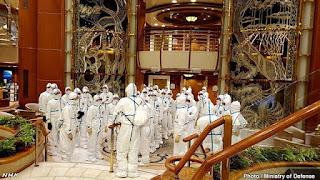*****
Antonio Gutteress, the UN secretary general, had proposed a global ceasefire on 23 March. The pandemic is expected to last between two and three
years. While it lasts, let us focus on this common enemy by stopping all wars
and conflicts. ‘The fury of the virus illustrates the folly of war’,
he said.
Surprisingly, many armed groups supported the truce
proposal. By early April, fighters in twelve countries shelved their arms. They
included a communist guerrilla group in Philippines, liberation armies in
Columbia and Sudan. (South Sudan, the world’s newest nation, has 12 million
people and 4 ventilators.) A Saudi Arabia-led coalition and the Houthi rebels declared
ceasefire for two weeks. Syria, Lebanon,
Iraq, Yemen jointly appealed for a halt to all fighting in the Middle East. Currently
310 million children in the conflict zones are deprived of school meals, their
main source of nutrition, due to school closures.
On 30 March, 53 countries issued a letter supporting
the Global Ceasefire proposal. France was the only nuclear nation to sign it.
Encouraged by the letter, Antonio Gutteress reissued an appeal on 3 April.
*****
Friday marked the 75th anniversary of the
end of WWII. The five victors- USA, China, Russia, UK and France formed an
exclusive nuclear club. They also gave themselves veto, a power as dangerous as nuclear weapons. Thanks to that
power, USA and UK allowed apartheid to continue in South Africa for 44 years,
Israel’s land grabbing is protected by the USA, and Russia vetoes resolutions against Assad. These five countries are authorized
to invade, slaughter, carry out genocide and nuclear-bomb nations with such
impunity that the UN charter doesn’t even allow a resolution condemning them.
The Global Ceasefire proposal, therefore, needed the
support of the big bullies.
*****
The USA (read Trump) initially insisted the resolution
must include ‘Wuhan virus’ in the text. It was duly rejected. After four weeks
of virtual talks and several drafts, USA asked to remove references to the World Health Organisation. In this
election year, WHO is Trump’s enemy no. 2. WHO has failed to confirm, as Trump
would like them to, that the virus originated in a Chinese lab.
China and Russia said they would veto if references to WHO are excluded.
France, along with Tunisia, is the sponsor of this
resolution. France persisted and developed a compromise. Reaching a compromise
through international Zoom meetings is not easy. On Thursday, the final draft
included the wording ‘UN specialized health
agencies’. The Chinese and Russians approved it, since in their mind they
read this as WHO. The negotiating Americans found the wording acceptable
because WHO was not mentioned. Late evening on 7 May, Americans approved the
final draft. On Friday, it would be placed before the Security Council for a vote,
simply a technicality.
*****
On Friday, 8 May, USA used its veto power and blocked the resolution. It said “UN specialized health
agencies was an indirect reference to WHO".
WWII continues to haunt us.
Ravi












